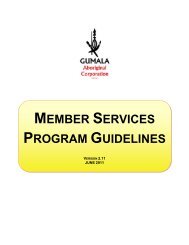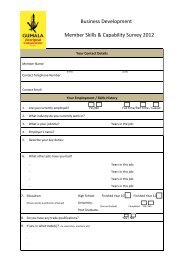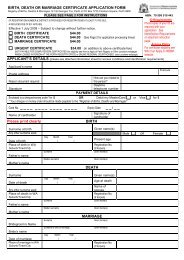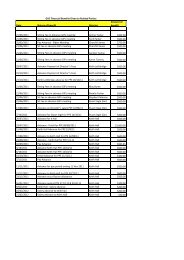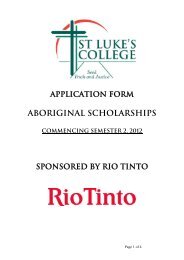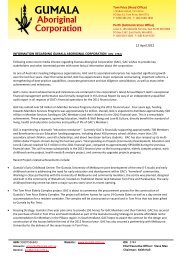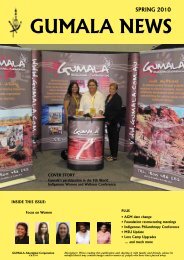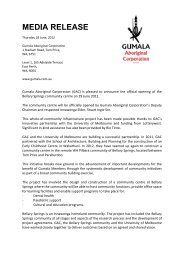Gumala News - Autumn 2010 Members Edition
Gumala News - Autumn 2010 Members Edition
Gumala News - Autumn 2010 Members Edition
Create successful ePaper yourself
Turn your PDF publications into a flip-book with our unique Google optimized e-Paper software.
GUMALA NEWS AUTUMN <strong>2010</strong><br />
GUMALA NEWS AUTUMN <strong>2010</strong><br />
University intern progresses GAC’s plans to<br />
help reduce rates of Chronic Kidney Disease<br />
United States university student Gina<br />
Newell has successfully progressed<br />
<strong>Gumala</strong>’s Renal (Dialysis) Health<br />
Program during her three-month<br />
internship based out of our Tom<br />
Price office.<br />
Gina said compared to other<br />
indigenous communities she had<br />
worked with in other countries,<br />
<strong>Gumala</strong> members in our local<br />
communities have a more proactive<br />
attitude about wanting local renal<br />
health services. Gina carried out<br />
significant research into Indigenous<br />
Australians before arriving in the<br />
Pilbara, and found herself fascinated<br />
by their history, culture and<br />
traditions.<br />
“During my time in Tom Price,<br />
as well as on visits to Bellary and<br />
Roebourne, everyone has been<br />
very welcoming to me,” Gina told<br />
<strong>Gumala</strong> <strong>News</strong>. “I received a lot<br />
of support from the Elders, GAC<br />
members and our Directors.<br />
“May Byrne and Archie Tucker<br />
have given me great support and<br />
encouragement. Greg Tucker has<br />
also been very supportive and has<br />
provided me with a lot of guidance.<br />
“<strong>Gumala</strong>’s traditional owners see a<br />
huge need for renal health services<br />
here in the Pilbara because the main<br />
problem at the moment is they<br />
have to move from their home and<br />
land to get treatment. This can be<br />
very distressing for them because<br />
their families are here and they are<br />
very connected to their land and<br />
culture.”<br />
Gina said the overall goal of the<br />
project is to create a comprehensive<br />
renal mobile/satellite health clinic<br />
that serves the <strong>Gumala</strong> Aboriginal<br />
Corporation (GAC) membership<br />
living in the Pilbara region by the<br />
end of 2011.<br />
“The specific objectives of the<br />
program are to:<br />
• Establish satellite clinics to increase<br />
patient access to reliable treatment,<br />
decrease patient time spent in<br />
transport and promote a better<br />
quality of life;<br />
• Develop a mobile service that will<br />
regularly travel from the regional<br />
hub to the patient’s homes and/or to<br />
Gina Newell during a visit to Rio Tinto’s Yandi mine.<br />
satellite clinics. There are number of<br />
community groups active in the West<br />
Pilbara region that are looking to<br />
create a lobby group to call on the<br />
government and a number of donor<br />
bodies to provide financial support<br />
to employ a full time person that<br />
would be responsible for travelling<br />
to the satellite clinics to supervise<br />
treatments.<br />
The preferred option would be<br />
to station the person in the town<br />
where the satellite clinic is so that<br />
transportation blockages caused by<br />
cyclone season do not adversely<br />
affect the treatment plans of the<br />
patients.<br />
• Enhance/increase residential<br />
facilities around existing treatment<br />
sites to enable more patients to<br />
move residence to promote ease of<br />
use.<br />
“The Federal Government<br />
announced in June 2009 that<br />
construction will begin by the end of<br />
the year on a Renal Dialysis Hostel<br />
for South Hedland. This facility will<br />
include twin share accommodation<br />
for up to 20 beds with the potential<br />
to extend to 40 resident beds<br />
in the future as well as dining,<br />
kitchen facilities and some staff<br />
accommodation.<br />
“This facility will provide a place<br />
for Indigenous persons to rest after<br />
treatment and ensure that those who<br />
primarily reside in Perth are able to<br />
return to country periodically for<br />
cultural events,” Gina added.<br />
GAC and IBN have given inprinciple<br />
agreement for funding<br />
support, while the WA Country<br />
Health Service (WACHS) has<br />
indicated it is willing to provide<br />
a possible site, as well as training<br />
support.<br />
Gina, who has submitted a detailed<br />
report to GAC on the Renal<br />
(Dialysis) Health Program, said she<br />
wishes the program every success.<br />
Fact File :<br />
Chronic Kidney<br />
Disease<br />
- by Gina Newell<br />
Chronic Kidney Disease (CKD) is a<br />
significant and growing public health<br />
problem responsible for substantial<br />
burden of illness and premature<br />
mortality in Australian Indigenous<br />
people. Some pertinent facts about<br />
CKD:<br />
• CKD is the seventh most common<br />
cause of death, exceeding diabetes<br />
and respiratory disease and suicide.<br />
• Early manifestation of CKD is both<br />
silent and nearly 90% of early CKD<br />
is unrecognised and untreated.<br />
• Nearly half of the people with<br />
diabetes have CKD, which increases<br />
the risk of cardiovascular by up to<br />
20 times.<br />
• Direct costs of CKD estimated<br />
at $650 million in 2006 and<br />
increasing.<br />
• The cost per person on hospital<br />
haemodialysis ($82,764), satellite<br />
dialysis ($48,631), home dialysis<br />
($44,739) and peritoneal dialysis<br />
($56,828).<br />
• Approximately 2,000 patients<br />
are entering End Stage Kidney<br />
Disease (ESKD) dialysis programs<br />
per year with the mean duration<br />
of antecedent CKD being<br />
approximately 10 years.<br />
• The most common causes of ESKD<br />
are glomerulonephritis, diabetic<br />
nephropathy and hypertension,<br />
accounting for 80% of the cases.<br />
• The incidence of new ESKD<br />
patients, adjusted for age and gender<br />
among Indigenous Australians is<br />
eight times the rate observed for<br />
non-Indigenous Australians.<br />
• The Pilbara region of WA had<br />
the second highest incidence of<br />
Renal Disease in the state with<br />
approximately 81 persons per<br />
100,000 suffering from ESKD.<br />
GUMALA BUS<br />
TIMETABLE<br />
SCHEDULED SERVICES<br />
FOR MEMBERS<br />
MONDAY, WEDNESDAY AND FRIDAYS :<br />
Leave Bellary<br />
Arrive Paraburdoo<br />
Leave Paraburdoo<br />
Arrive Bellary<br />
Leave Bellary<br />
Arrive Wakathuni<br />
Leave Wakathuni<br />
Arrive Tom Price<br />
Leave Tom Price<br />
9am<br />
9:30am<br />
10:45am<br />
11:15am<br />
11.30am<br />
11:45am<br />
12 noon<br />
12:30pm<br />
14:00pm<br />
Final stop Bellary - arrives at 15.00pm<br />
FORTNIGHTLY TRIP: YOUNGALEENA :<br />
Every first Monday, and third Monday of the month<br />
ONCE A MONTH: PORT HEDLAND :<br />
Every last Thursday of the month<br />
Note: Bus runs are subject change if they clash with<br />
other bookings. To confirm your booking, call Warren<br />
Ingie on 0428 963 724 or Carol Nicholson on<br />
1800486252.<br />
Airlines proof of identity policies<br />
<strong>Members</strong> who are travelling by plane should note that airlines have strict<br />
proof of identity policies for domestic flights. Airlines can request ID for all<br />
passengers, including children. Your medicare card should have all of your<br />
children listed on it and this can be used as proof of identity for your children<br />
for domestic air travel.<br />
Page 12 <strong>Gumala</strong> Aboriginal Corporation <strong>Gumala</strong> Aboriginal Corporation Page 13



